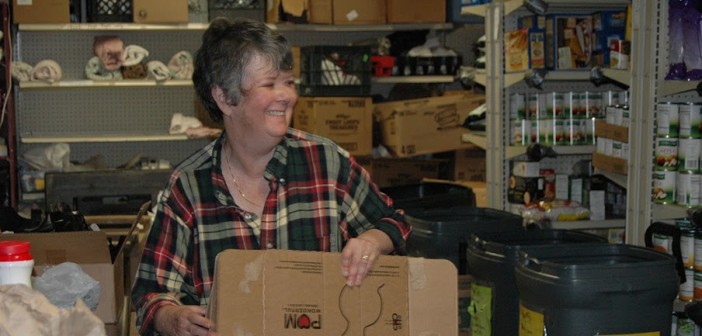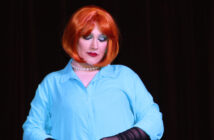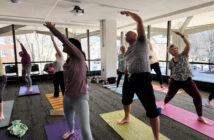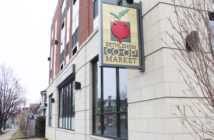Nestled on the corner of West Fourth and Wyandotte streets is a place that provides the hope of having a bright future.
New Bethany Ministries has been serving the Lehigh Valley and surrounding communities since 1985. They provide people with the means to get back on their feet by providing a supportive environment for poor and homeless men, women and families. New Bethany’s mission is to try to create secure futures for those in need.
New Bethany was started when five churches headed by the Episcopal Dioceses joined together and decided that there was a need for taking care of the homeless. The ministries started out as single units for 20 people to live. However, as time progressed, new housing and programs were added to meet additional needs.
New Bethany Ministries has numerous programs, such as the Mollard Hospitality Center and two main housing programs.
Diane Elliott, the executive director of New Bethany Ministries, calls the ministries, “a full service homeless facility.” Their hospitality center consists of a meal center, which is open every day and serves about 175 people each week. The center also has an emergency food pantry that provides families with three-day food baskets distributed on a monthly basis.
“We serve the Lehigh Valley, so (all of) our clients are from the Lehigh Valley,” Elliott said. “Assuming that everything is in order, we don’t turn anyone away.”
The housing arrangements are divided into two main programs: the transitional and the restoration housing. The transitional housing program is a six-month process catered to helping people get back on their feet. New Bethany puts their clients in touch with any services they might need, while teaching them how to save for a security deposit and first month’s rent on a permanent housing location.
The second housing program is the more permanent restoration housing program. There are 10 apartments for people to live in for 18 to 24 months. The purpose of this program is for people to get their education. The head of the household must go to school and be proficient in all classes that are taken. If there is a family living in one of these apartments, one parent must go to school and one parent has to work. To be labeled a success, the clients must finish school, find stable housing and a job to be able to afford the basics.
Elliott said this is one of the few programs in both of the housing programs that attempts to keep the families together. In other homeless programs the kids go with the mother to one program and the father is assigned to another program.
New Bethany does not believe in separating families.
“(There) is not a lot of time and affordable housing in the Lehigh Valley is almost non-existent,” Elliott said. “Helping them to get to the next steps takes a lot of work.”
New Bethany also offers a representation payee program, which is for people with disabilities. The program is a homeless prevention program, as well. Social security allows New Bethany to receive their client’s social security checks in order to pay their bills in full and on time. New Bethany also helps the clients by saving their money and giving them a spending check each month.
“The (housing) program is probably the most successful,” said Brandy Garofalo, the director of the Mollard Hospitality Center. “My (program) is very basic. Everyone needs to eat and stay clean, but I never move anyone forward.”
Despite all of the work that New Bethany does, they have a relatively small staff. With 14 people running the day-to-day operations, they primarily rely on volunteers. Nearly 1,000 volunteers assist by cooking meals, stocking the food pantry or putting together goodie bags.
“We operate with a very small staff,” Elliott said. “We estimated that we touched the lives of over 9,000 people in one way or another. Whether that is through eating meals here, sending meals home, living here or having the services of the representative payee program. We help quite a few people and we do it with a small staff.”
Elliott said that a lot of the people who volunteer say that seeing smiles on the client’s faces is enough of a thank you for them. The many different interactions that take place gives way more to the volunteers than the clients could give.
Another service that New Bethany offers is free health screening that is completed by nursing students or physicians that donate their time.
“If New Bethany was not here, there would be no place for a lot of these people to go,” said Fiona Byrne, assistant director of the Mollard Hospitality Center. “We are very convenient (because) we are within walking distance of a lot of places.”
Giving back to the community as a whole is also part of New Bethany’s mission. From a purely practical standpoint, New Bethany decreases the need for municipal services. The shelter keeps people off the streets by providing them with a place to stay, which decreases the chances of them ending up in jail.
Elliott tries to keep in touch and follow-up with the people that have received help through New Bethany’s housing program. When people come into the meal center or the food pantry it is more difficult to maintain personal contact. At New Bethany, the purpose is to have people come to them when they need help, and once they get that help they are better able to provide for themselves and their families.
“For the people who are capable, we hope that they (can) get back on their feet,” Elliott said. “That they have permanent housing, a job and be able to learn how to sustain both. For the people that have mental health issues we just want to give them some joy and some peace.”






Comment policy
Comments posted to The Brown and White website are reviewed by a moderator before being approved. Incendiary speech or harassing language, including comments targeted at individuals, may be deemed unacceptable and not published. Spam and other soliciting will also be declined.
The Brown and White also reserves the right to not publish entirely anonymous comments.